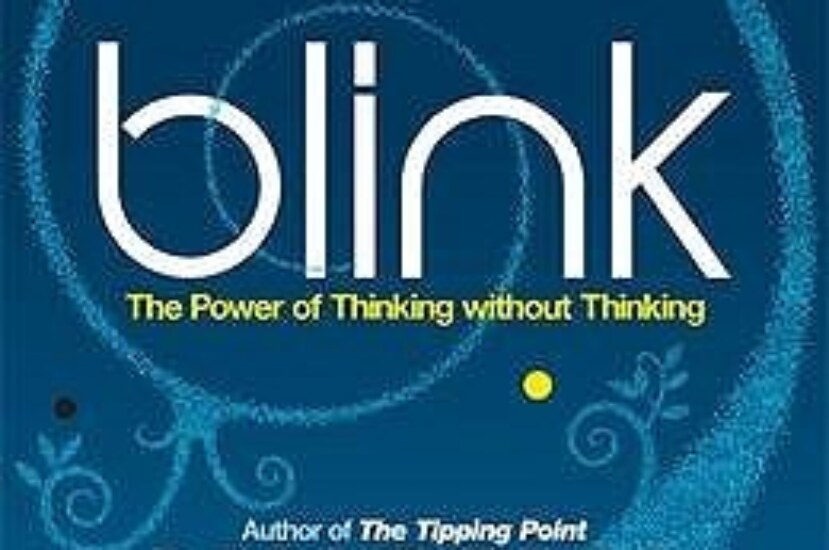Today we will take a look at Malcolm Gladwell’s book called Blink to learn how to make better decisions. Making decisions has always been a valuable skill that is helping us to move forward in our lives and achieve our goals. So let’s take a look at some of the things that influence our decisions and how we can become better at this valuable skill.
 No.01: we make snap decisions
No.01: we make snap decisions
we make snap decisions and rationalize later while we might think that we make calculated decisions and always select the best possible solution that is far from the truth, what is happening instead is that we make snap decisions in a blink of any eye and after that we rationalize them. For ex. Your friends might suggest going and eating some fast food and you instantly agree to that, despite the fact that you are following a strict diet.
If some of them would notice that they might ask you did not follow a strict diet to what you might say that this is a cheat meal even though you already had one this week or you might say that one additional meal will not make a huge difference?
It is important to realize this fact and be self-conscious bout it. When we are making bigger decisions it’s important to give them more time and consideration.
No.2: Our intuition is often right
Do you sometimes have this feeling that you must take a certain choice or decision but you can’t explain why? This is called intuition but we often shy away from making decisions based on intuition because we can’t validate or explain them. Our intuition comes from a cumulative knowledge and experience with a mix of some of the emotions and it points us in a direction we should go. When you see the ad that tells you that you can make ten thousand a month by doing nothing, you don’t click on it because your intuition is telling you that it’s fake, so sometimes it’s a smart move to simply trust your intuition and go with it even without considering the options.
No.3: Two ways we make decisions
there are generally two ways how to make a decision fast way and a long way of making decisions, first let’s take a look at the long one, this is when we try to decide something important like what university to study or which career path to choose. To make the best decision, we gather the information and write down the pros and cons of each option and then evaluate them. We might also ask other people for their advice, just to get a different perspective that might help.
This process is complicated and energy draining. The second option is to make a snap decision and simply go with your gut. This method is fast and effective for any of our everyday choices like choosing what to eat and what to wear.
Both of the ways we make decisions play an important role in our life. Our Analytical side is good for making big decisions but it would be completely useless if would have to use it to decide in which restaurant to eat as it would take absolutely ages, on other hand, our intuitive side is good for little everyday decisions as we can make them quickly and effortlessly but it would not be a great idea to make a snap decision about where to live
No. 4: How stress impacts our decisions.
We make our decisions under different circumstances and one such condition is where we make decisions under stress, In our busy and demanding lives, stressful situations AND STRESS IS becoming more and more common and while we are under distress, we start to lose basic abilities to make THE CORRECT decisions, this is because we can’t properly evaluate which information is important and which one is not. So, if you want to improve your decision-making, it’s important that you don’t make any decisions while you are under the stress. I personally try to make important decisions in my life in the morning as that is when my mind is clear and my energy levels are high.
No. 5: Ignore irrelevant information.
Another way how you can improve your decision-making is by learning how to ignore irrelevant information. I have learned it from my personal exp. Usually, during the hiring process, I get attached to few specific candidates based on their resume but this has backfired me multiple times when chosen candidates are turned out to be weak hires, since then I try not to attach myself to certain candidates instead I give all qualified candidates the sample job and then base my decision on their performance and communication skills. I think being able to identify and ignore irrelevant information is extremely important as we live in a digital age where there are endless streams of information.
If you want to make better decisions then focus on some key pieces of information that have the most impact on your decisions.
No. 6: Information Overload
It is difficult in understanding an issue and effectively making a decision when one has too much information about the issue. The human brain has fairly limited cognitive processing capacity. Consequently, when information overload occurs, we are likely to make weaker decisions with access to the internet and endless media channels, we are exposed to more information than ever before. Here are some reasons, why information overload is happening. One the simplicity of creating, duplicating, and sharing of information online, no. 2 exponential increase in channels to receive the information by radio, television, print media, websites, email, smartphones, etc. No.3 is the high volume of conflicting, contradictory, and plain old inaccurate information.
To deal with information overload, it’s important to have some strategies in place, for that purpose, you can use the following strategies: one ignores some of the information as not of it will be relevant – feel free to take action without all the facts and three filters all the information ruthlessly. Once you know, how to deal with information overload by being selective and filtering information, you will feel more confident with your choices.




Leave a comment